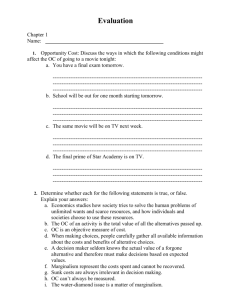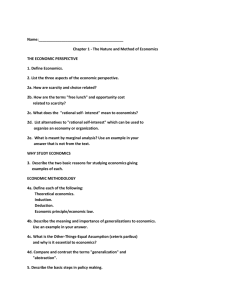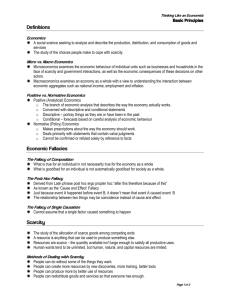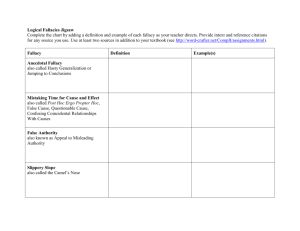Economics
advertisement
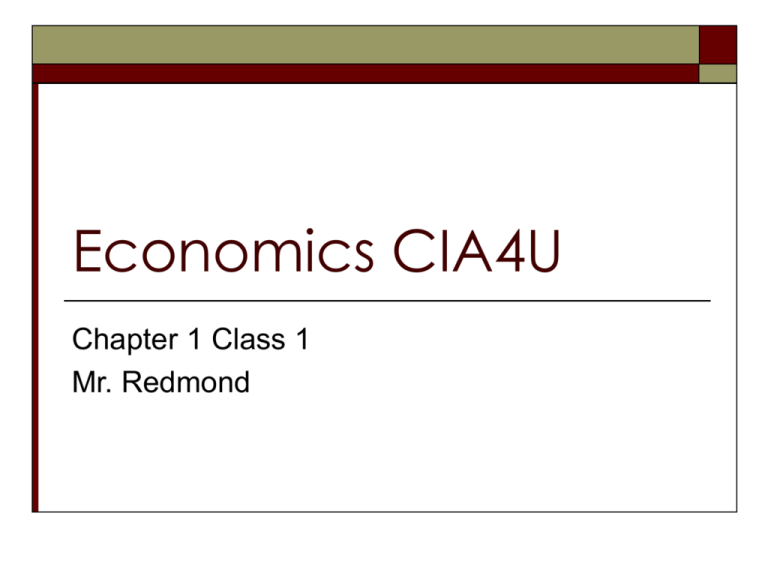
Economics CIA4U Chapter 1 Class 1 Mr. Redmond Expectations 1. 2. 3. 4. 5. Show up on time Help each other learn Show Respect Get involved in classroom discussion Do your best to reach your goals! THIS IS A GRADE 12 U LEVEL CLASS! Therefore… Let me get to know you On a piece of paper Write your name Why you chose to take this course? Your interests (at least 3) What your goals are for this course (at least 2)? What action will you take to achieve your goals? What are your plans after school (at least 2-3 sentences)? Handout Textbooks Course outline Economics? Who cares? What’s In It For Me? Why study economics? Understand the world Why do governments make the decision they do? Why do businesses succeed or fail? Why do I pay so much for my cell phone? Help you make good choices to maximize your scarce resources $$$$$$$$ Better informed for voting Understand economic policy/platform Agenda Go over course outline What is economics? What is an economy? What is the goal of economics? What do we want the economy to provide us? Analytical Economics vs Normative Economics What is Economics? Geopolitics Money Stock market Government Trade Supply and Demand Article article on debt What is Economics? Definition: The study human activity, involved in making decisions about the use of scarce resources to satisfy human wants and needs Origin - Greek Word oikonomia Oikos: House Nemo: Manage Wise management of one’s own household What is an Economy? ? What is an Economy? A self-sustaining system in which many independent transactions (often triggered by self-interest) create distinct flows of money and products and services What is an Economy? Consumer Goods $$$$ Retailer What is an Economy? Consumer Goods $$$$ Retailer Goods $$$$ Manufacturer What is an Economy? Consumer Goods $$$$ Retailer Goods $$$$ $$$ Manufacturer Goods Service $$$$ Employees What is an Economy? Consumer Goods $$$$ Retailer Goods $$$$ Government $$$ Manufacturer Goods Service $$$$ Employees What is an Economy? Consumer Goods $$$$ Retailer Goods $$$$ Government $$$ Manufacturer Goods Service $$$$ Employees What is an Economy? Consumer Goods $$$$ Retailer Goods $$$$ Manufacturer Service $$$$ Employees It can get a little complicated… What is the Goal of Economics? Maximize the satisfaction of human WANTS (goods and services) with the minimum use of resources Effective: Use of resources that achieves what we want (the right goal) Efficient: Use of the minimum amount of resources that achieves what we want (the right way) What do we want? GOODS: tangible things that satisfy human wants iPhone, Hockey Stick, Car etc… SERVICES: items that satisfy human wants, that are intangible, lasting only for the time of its production Haircut, taxi ride, massage etc… Analytical (positive) Economics Facts about the world Descriptive: Describes things the way they are or were Ex Automobile sales are up 7% from last year Conditional: Forecasts based on analysis Ex If x occurs then y will follow Ex If the U.S attacks Saudi Arabia, gasoline prices will increase Normative Economics Deals with statements that contain value judgments or opinions A.K.A. Policy Economics Should gambling be legalized? Should the city set up shelters to support homeless people? Should we legalize prostitution? Marijuana? Building an Economy What is an Economic Event? Something that has had an impact on the economy? What is the economy? Businesses Consumers Households Review What is economics? What is an economy? What is the goal of economics? Goods vs Services Vending Machine Economy Analytical vs. Normative Economics is a Social Science How do we know what is the best decision to maximize our scarce resources? Understanding human behaviour (decisions) Complicated because of … Needs and wants of different groups differ Needs and wants are based Values and Belief Societal Values and Beliefs are changing Predicting Human Behaviour Individual Behaviour is hard to predict Group Behaviour is easier to predict On a hot sunny day more people will: Buy ice cream Go to the pool Not come to class Use of statistics and probabilities Key assumption Humans are rational, social and self-interested Scarcity Human needs and wants are unlimited Needs: Needed to survive Wants: Non-essential items Resources (land, labour, capital) are limited Needs and Wants > Resources = Scarcity Dealing with scarcity dominates Economics We need to make choices Opportunity Cost The sum or true cost of all that is lost in order to produce or consume what we decide we want the most. In other words, opportunity cost is the cost of spending your money, time and energy on one thing, instead of another thing. For every decision that we make, an alternative decision is possible, and the difference in outcomes is the opportunity cost that we face Every decision has consequences What do you gain? What do you loose? Opportunity Cost Video games vs. Studying Working a second job to pay down my mortgage – opportunity cost? Think about the opportunity costs of every dollar that you spend, and what else you could have done with it instead. Think like our good friend Warren. Opportunity Cost Warren Buffet World renown investor One of the richest people in the world Is frugal with his money His perspective. For him, spending $4 on a cappuccino doesn’t merely mean $4 lost today; it also means a potential $40 or more in foregone future earnings and capital growth. Opportunity Cost What would you do with $2000 What are your priorities? List at least three alternatives? Spring Break Trip to Cancun Blu-Ray home theatre system Save for college or university How would you evaluate the alternatives? Opportunity Cost NOTE: Opportunity cost of a decision is only the next best option not all of them Ex If you choose to spend $2000 on a trip the opportunity cost of the $2000 is either enjoyment of the Blu-Ray system OR the savings for school (+ interest) Does Opportunity Cost Always have to do with money? Opportunity cost is not just restricted to monetary or financial costs but anything that has value (ex. pleasure, time, etc.) Ex. Take the family to the carribean vs renovate your kitchen Opportunity cost? Opportunity cost The enjoyment of cooking in a new kitchen What if the scenario was vice versa? What would the opportunity cost(s) be? Opportunity Cost Sarah decides to enroll in university? What is her opportunity cost? Sarah’s total cost of the school year Tuition, books, living expenses AND…. Money she would have made from working instead of going to school Opportunity Cost and Political Decisions Minimum wage – opportunity cost? Discussion What are you going to do after grade 12? College University Work Travel Work Abroad Grade 13 What is the opportunity cost for you? (Next Best) Decision Making Criteria p9 1. 2. 3. 4. 5. 6. 7. 8. 9. Define the problem Clarify goals and priorities List possible alternatives Establish criteria to judge alternatives Weight each criterion based on goals and priorities Evaluate each alternative Make a decision Act on the decision Assess effectiveness Decision Making Matrix Priority Weight Alternative 1 Alternative 2 Alternative 3 Priority 1 Priority 2 Priority 3 Total Weighted Value Decision Making Matrix Priority Getting good marks Getting ready for post secondary Income Fun with friends Weight High (3x) High (3x) Moderate (2x) Low (1x) Spring Break Trip to Cancun -3 -3 -2 +1 Blu-Ray home theatre system -3 -3 -2 +1 Save for college or university +3 +3 +2 -1 Total Weighted Value -8 +1 -8 +1 +8 -1 Who Stays? You are a passenger on the Costa Concordia (see below). Your captain has was showing off his navigating skills and ran the ship aground. The ship is sinking and all but one of the life boats is damaged. There are 25 people left on board Only 5 can get in the life boat. Who gets to go on the life boat? Who gets to tread water with the sharks (you are 20 miles off shore)? Goals 1. 2. 3. 4. Survival See your family again Wealth Save the most needy Criteria 1. Make a contribution to the boat (x3) 1. 2. 2. Contribute to you after (x1) 1. 2. 3. Physically Fit Age (Young is good - but no kids) Status Famous Rich Impact on society (x2) 1. 2. Education Status Decision Making Matrix Priority Make a contribution to the boat Contribute to you after Impact on society Weight x3 x1 x2 Professional Athletes. Free autograph anyone? Save the kids!! Oh they’re sooooo cuuute! Gramps and Grams (sorry no walkers allowed in the boat) Doctors Free pec implants? Your High School Economics Teacher Can you say A++?? Total Weighted Value Opportunity Cost Production Possibility Curve Production Possibility Curve (PPC) The 4 Assumptions of PPC Illustrates the concept of opportunity cost Each point on the curve illustrates the trade off that must be made PPC only demonstrates what happens when a society moves from one level of production to another 1) 2) 3) 4) there is a limited supply of resources/fully employed technology is also limited the economy is running efficiently there exists an only “two good” world Production Possibilities – are the amounts of goods or services a firm or society could produce, given a fixed amount of land, labour, technology and other inputs. Constant Opportunity Cost Production Possibility Curve 1 Production Possibilities A B C D E F Ploughs 0 1 2 3 4 5 Opportunity/ Relative Loaves of Cost Bread (Bread) 15000 12000 3000 9000 3000 6000 3000 3000 3000 0 3000 Opportunity Cost Production Possibility Curve Opportunity Cost A 16000 14000 B 12000 C Bread 10000 H 8000 D 6000 G 4000 E 2000 F 0 0 1 2 3 Ploughs 4 5 6 Production Possibility Curve PPC The Opportunity cost is expressed in the good given up (i.e. 3000 loaves of bread) not dollars A.K.A. The relative cost PPC shows the maximum output or frontier What happened at point G? What happened at point H? The law of increasing relative cost When an economy focuses more of it’s resources on a single product the relative cost increases Why? Resources are not 100% interchangeable. Can a blacksmith bake bread? Can she do it as well as a baker? What does this mean? The trade offs faced by society are not fixed If society produces a few ploughs it will use those resources – people and machines- that are best equipped for building ploughs. But as more ploughs are being produced, more resources are needed and doing so becomes difficult. It will result on those being less skilled at making ploughs. Opportunity Cost Production Possibility Curve 2 Production Possibilities Opportunity/ Relative Cost Loaves of Bread Ploughs A 0 15000 B 1 14000 1000 C 2 12000 2000 D 3 9000 3000 E 4 5000 4000 F 5 0 5000 Opportunity Cost Production Possibility Curve 2 Opportunity Cost A 16000 B 14000 C Bread 12000 D 10000 8000 E 6000 4000 2000 F 0 0 1 2 3 Ploughs 4 5 6 As more ploughs are produced, the most convertible resources are consumed/used first, the resources remaining are less productive in making ploughs and therefore the cost of producing ploughs increases (outputs) – Law of increasing relative costs (AKA Increasing Opportunity Cost) The Law of Diminishing Returns Law of Diminishing Returns deals with inputs (Resources – Labour) Definition: Outputs will increase when ONE input is increased but only to a certain point The Law of Diminishing Returns Year Cultivated Land 1 2 3 4 5 6 7 10 10 10 10 10 10 10 Labour force (Workers) Total Production (Bushels of Corn) 1 2 3 4 5 6 7 1000 2000 2800 3400 3800 3900 3900 Increase in Yield (Extra Bushels) 1000 800 600 400 100 0 Law of Diminishing Returns Law of Diminishing Returns 4500 4000 Bushels of Corn 3500 3000 Total Production (Bushels of Corn) 2500 2000 Increase in Yield (extra Bushels) 1500 1000 500 0 0 1 2 3 4 5 Number of Workers 6 7 8 The Law of Increasing Returns to Scale AKA Economies of Scale Law of Increasing Returns to scale deals with inputs (Resources – land, labour) Definition: The RATE of output will increase when ALL inputs in production are increased Why? Teamwork and specialization The Law of Increasing Returns to Scale Cultivated Land Year Labourforce (Workers) Total Production (Bushels of Corn) Increase in Yield (extra Bushels) 1 10 1 1000 2 20 2 2000 1000 3 30 3 3200 1200 4 40 4 4600 1400 5 50 5 6200 1600 6 60 6 8000 1800 7 70 7 10000 2000 The Law of Increasing Returns to Scale Law of Increasing Returns to Scale 12000 Bushels of Corn 10000 8000 Total Production (Bushels of Corn) 6000 Increase in Yield (extra Bushels) 4000 2000 0 0 1 2 3 4 5 6 Number of Workers and ha of land (x10) 7 8 Agenda Review laws Falicies Review Laws Law of Increasing Relative Cost Law of Diminishing Returns Opportunity/Relative cost increases with specialization Outputs will increase when ONE input is increased but only to a certain point Law of Increasing Returns to Scale The RATE of output will increase when ALL inputs in production are increased What is a Fallacy? A hypothesis that has been proven false still accepted by many people because it appears, at first glance, to be right. The Fallacy of Composition Belief that individual benefit automatically translates into social benefit “If it works for me that it must work for the rest of society” The Fallacy of Composition Death of the commons What happens if one farmer puts one extra cow on common land? One extra fat cow What happens if many farmers put just one extra cow on common land? Commons were ruined for everyone The Fallacy of Composition ex. Farmer decides to produce more corn = more money for him BUT … if every farmer that year decided to produce more corn the price of corn would drop and farmers could not recover operating expenses Can also work the other way belief that what is good for society is good for individual Wrong - free trade may benefit many - but some people have lost jobs Fallacy of Composition Every player on the team is a superstar and a great player, so the team is a great team. The best action for a business during a time of recessions might be to lay layoff staff and reduce production. An individual business can increase profits by reduce expenses. However, one businesses expense is another businesses sale, so if all firms try to increase their profits by reducing expenses, they might all experience a reduction in profits, as sales decline. The Post Hoc Fallacy (Causeand-effect fallacy) Example: the alarm clock rang (a) and then Mr. Hoey got out of bed (b) (A) did cause (B) Example: the alarm clock rang (a) and then the sun came up (b) Even though (b) happened after (a), (a) did not cause (b) to happen The Post Hoc Fallacy (Causeand-effect fallacy) "post hoc ergo propter hoc” Translation “after this therefore because of this” people sometimes assume because event B took place after event A, it must have been caused by event A Post-Hoc Fallacy Samson is scratched by a cat while visiting her friend. Two days later she comes down with a fever. Joan concludes that the cat's scratch must be the cause of her illness. Most people who are read the last rites die shortly afterwards. Therefore: Priests are going around killing people with magic words! The Fallacy of Single Causation Closely linked to Post Hoc Fallacy A single person/event caused a particular event ex. The great depression was caused by the 1929 stock market crash –WRONG numerous things caused the Great Depression Single Causation Fallacy The Conservatives pass a new tax reform law that benefits wealthly Canadians. Shortly thereafter the economy takes a nose dive. The Liberals claim that the tax reform caused the economic woes and they push to get rid of it. Review for Quiz Monday Review Key Terms on p25 Decision Making Model Cruise ship Know laws and fallacies Be able to graph a production possibility curve Law of Increasing Relative Cost Law of Increasing Returns to Scale Interchangeable resources Class work Write your own fallacies Post hoc Single causation Composition P 24 #6 P24#6 a) b) c) d) e) f) Single Causation Composition Post hoc Composition Single Causation Composition g) h) i) TRUE Post hoc / Single Causation Post hoc / Single Causation END OF CHAPTER 1
